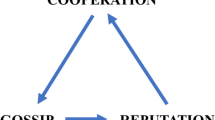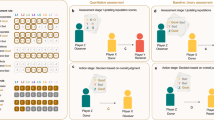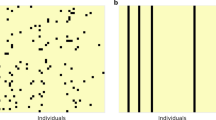Abstract
The problem of sustaining a public resource that everybody is free to overuse—the ‘tragedy of the commons’1,2,3,4,5,6,7—emerges in many social dilemmas, such as our inability to sustain the global climate. Public goods experiments4, which are used to study this type of problem, usually confirm that the collective benefit will not be produced. Because individuals and countries often participate in several social games simultaneously, the interaction of these games may provide a sophisticated way by which to maintain the public resource. Indirect reciprocity8, ‘give and you shall receive’, is built on reputation and can sustain a high level of cooperation, as shown by game theorists9,10,11. Here we show, through alternating rounds of public goods and indirect reciprocity games, that the need to maintain reputation for indirect reciprocity maintains contributions to the public good at an unexpectedly high level. But if rounds of indirect reciprocation are not expected, then contributions to the public good drop quickly to zero. Alternating the games leads to higher profits for all players. As reputation may be a currency that is valid in many social games, our approach could be used to test social dilemmas for their solubility.
This is a preview of subscription content, access via your institution
Access options
Subscribe to this journal
Receive 51 print issues and online access
$199.00 per year
only $3.90 per issue
Buy this article
- Purchase on Springer Link
- Instant access to full article PDF
Prices may be subject to local taxes which are calculated during checkout


Similar content being viewed by others
References
Hardin, G. The tragedy of the commons. Science 162, 1243–1248 (1968).
Dawes, R. Social dilemmas. Annu. Rev. Psychol. 31, 169–193 (1980).
Berkes, F., Feeny, D., McCay, B. J. & Acheson, J. M. The benefits of the commons. Nature 340, 91–93 (1989).
Ledyard, J. O. in Handbook of Experimental Economics (eds Kagel, J. H. & Roth, A. E.) 111–194 (Princeton Univ. Press, Princeton, 1995).
Hardin, G. Extensions of “the tragedy of the commons”. Science 280, 682–683 (1998).
Ostrom, E., Burger, J., Field, C. B., Norgaard, R. B. & Policansky, D. Sustainability—revisiting the commons: local lessons, global challenges. Science 284, 278–282 (1999).
Ostrom, E. Governing the Commons (Cambridge Univ. Press, Cambridge, 1999).
Alexander, R. D. The Biology of Moral Systems (de Gruyter, New York, 1987).
Nowak, M. A. & Sigmund, K. Evolution of indirect reciprocity by image scoring. Nature 393, 573–577 (1998).
Nowak, M. A. & Sigmund, K. The dynamics of indirect reciprocity. J. Theor. Biol. 194, 561–574 (1998).
Lotem, A., Fishman, M. A. & Stone, L. Evolution of cooperation between individuals. Nature 400, 226–227 (1999).
Fischbacher, U., Gächter, S. & Fehr, E. Are people conditionally cooperative? Evidence from a public goods experiment. Econ. Lett. 71, 397–404 (2001).
Boyd, R. & Richerson, P. J. Punishment allows the evolution of cooperation (or anything else) in sizable groups. Ethol. Sociobiol. 13, 171–195 (1992).
Fehr, E. & Gächter, S. Cooperation and punishment in public goods experiments. Am. Econ. Rev. 90, 980–994 (2000).
Gintis, H. Game Theory Evolving (Princeton Univ. Press, Princeton, 2000).
Fehr, E. & Gächter, S. Altruistic punishment in humans. Nature 415, 137–140 (2002).
Zahavi, A. in Cooperative Breeding in Birds: Long Term Studies in Behaviour and Ecology (eds Stacey, P. B. & Koenig, W. D.) 105–130 (Cambridge Univ. Press, Cambridge, 1991).
Wedekind, C. & Milinski, M. Cooperation through image scoring in humans. Science 288, 850–852 (2000).
Seinen, I. & Schram, A. Social status and group norms: indirect reciprocity in a helping experiment. Discussion Paper TI2001-003/1 (Tinbergen Institute, Amsterdam, 2001).
Milinski, M., Semmann, D., Bakker, T. C. M. & Krambeck, H.-J. Cooperation through indirect reciprocity: image scoring or standing strategy? Proc. R. Soc. Lond. B 268, 2495–2501 (2001).
Sigmund, K., Hauert, C. & Nowak, M. A. Reward and punishment. Proc. Natl Acad. Sci. USA 98, 10757–10762 (2001).
Coleman, J. S. Foundations of Social Theory (Harvard Univ. Press, Cambridge, MA, 1990).
Acknowledgements
We thank students at Hamburg University for their participation; E. Heinz and W. Kiesewetter for support; E. Fehr and K. Sigmund for comments; and the Max Planck Institute of Meteorology at Hamburg for hospitality.
Author information
Authors and Affiliations
Corresponding author
Ethics declarations
Competing interests
The authors declare no competing financial interests.
Rights and permissions
About this article
Cite this article
Milinski, M., Semmann, D. & Krambeck, HJ. Reputation helps solve the ‘tragedy of the commons’. Nature 415, 424–426 (2002). https://doi.org/10.1038/415424a
Received:
Accepted:
Issue Date:
DOI: https://doi.org/10.1038/415424a
This article is cited by
-
Effects of co-players' identity and reputation in the public goods game
Scientific Reports (2023)
-
Subjective consistency increases trust
Scientific Reports (2023)
-
Status invisibility alleviates the economic gradient in happiness in social network experiments
Nature Mental Health (2023)
-
The problem of opportunity
Biology & Philosophy (2023)
-
Communicating the cost of your altruism makes you cool—competitive altruism and sexual selection in a real-life charity situation
Behavioral Ecology and Sociobiology (2023)
Comments
By submitting a comment you agree to abide by our Terms and Community Guidelines. If you find something abusive or that does not comply with our terms or guidelines please flag it as inappropriate.



